2016: A Terrible Year, but a Great Year for Progressive Blockbusters
One of few positive things we can say about 2016 is that it provided us with some truly progressive blockbusters.
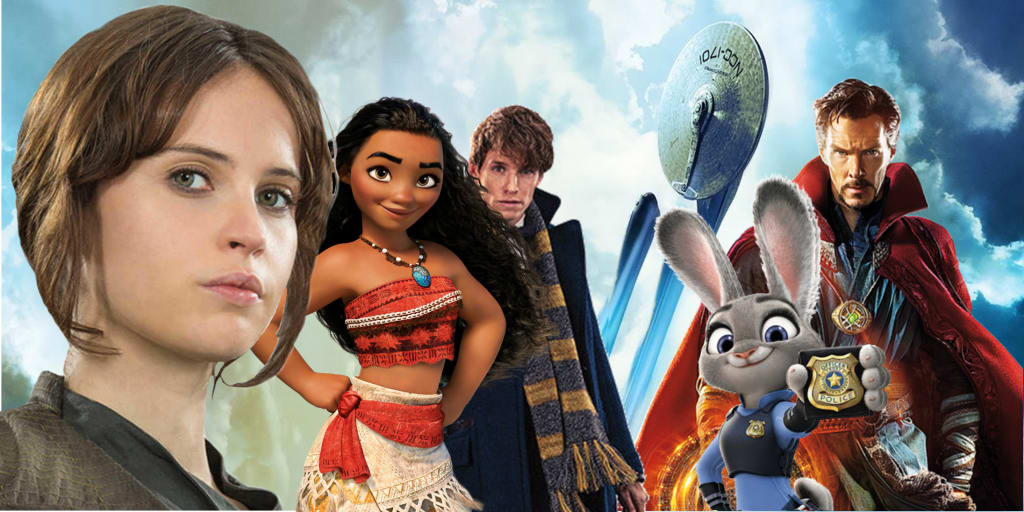
*This Article Contains Major Spoilers for Many of this Years Movies*
With divisive politics and the multitude of celebrity deaths, many people would conclude that 2016 has been a bit of a disappointing year all-round. It’s certainly been a strange old year for movie fans, with all manner of cinematic controversies arising, from the Batman v Superman review debacle to Nate Parker’s rape allegations. But overall, what can we take away from the movies of 2016? Are our popular releases saying anything in particular?
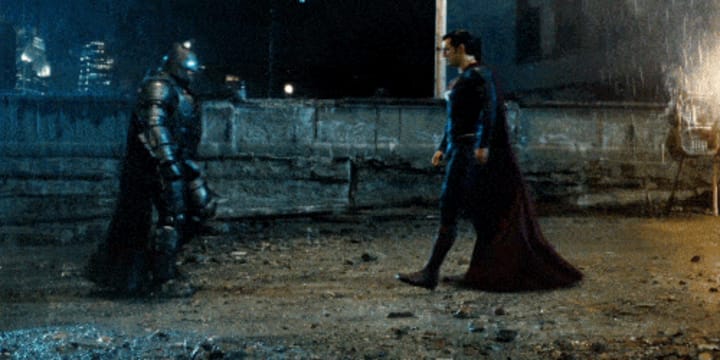
Some may argue that movies don’t say anything, but no matter how far flung or bizarre the places our screens may take us to, they are subject to their creator’s thoughts and opinions on themselves and their society, consciously or otherwise. As E.L. Doctorow said:
“The writer isn't made in a vacuum. Writers are witnesses.”
Though he’s talking specifically about writers, the same can definitely be applied to movie makers. 2016 has seen a massive shift in our social landscape, and films such as Star Trek Beyond, Fantastic Beasts and Where to Find Them, Moana, Doctor Strange, Zootopia and Rogue One: A Star Wars Story have reflected that in both overt and subtle ways.
So what is the sub textual connection between all of these movies? Read on to find out!
"You care so much! Don't you?!"
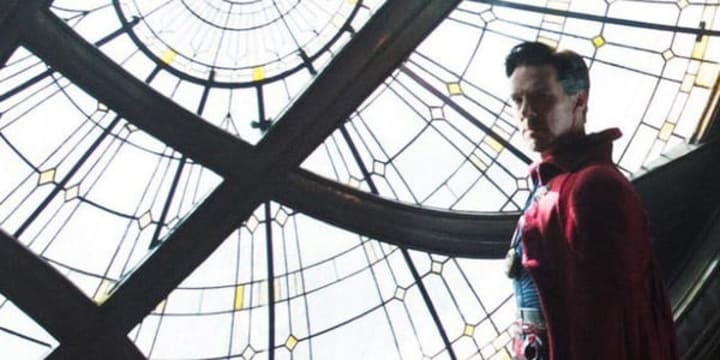
Doctor Strange in the Sanctum Sanctorum [Image: Marvel Studios]
Let's start with our heroes. Near the start of Doctor Strange, Stephen Strange (#BenedictCumberbatch) berates Christine Palmer (#RachelMcAdams) with this disdainful line that we see above. But this bitterness soon melts away as Strange learns the mystic arts, and we even see Strange lamenting the morality of his first kill. The end also sees him resolving his conflict with Dormammu irenically, outsmarting the villain with his temporal manipulations and accepting his place as a magical guardian of Earth.
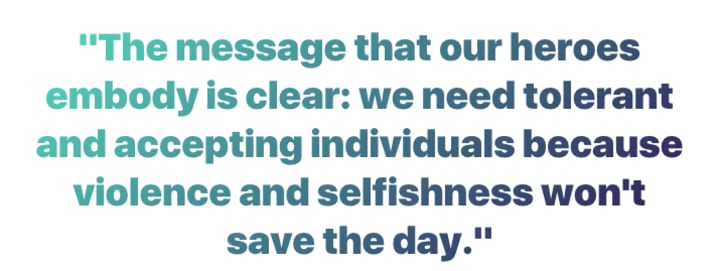
Similarly, in #BatmanvSuperman, Batman (#BenAffleck), like Strange, begins the story as self-assured, cynical and single-minded, but by the closing credits he has been forced to re-evaluate his position. Compassion has always been a staple characteristic of heroes, but 2016's blockbusters doubled down on promoting compassion and tolerance.
In Fantastic Beasts, Newt attempts to stop the destruction of New York through non-violent means by attempting to candidly talk to Credence (#EzraMiller), but he is prevented from succeeding due to the intervention of the disguised Grindelwald. Similarly, the makers of Moana emphatically stated that only the titular hero could have defeated the lava monster Te Kā because she was the sole character who could have emotionally connected to her. The message that our heroes embody is very clear: we need tolerant and accepting individuals, because violence and selfishness won't save the day.
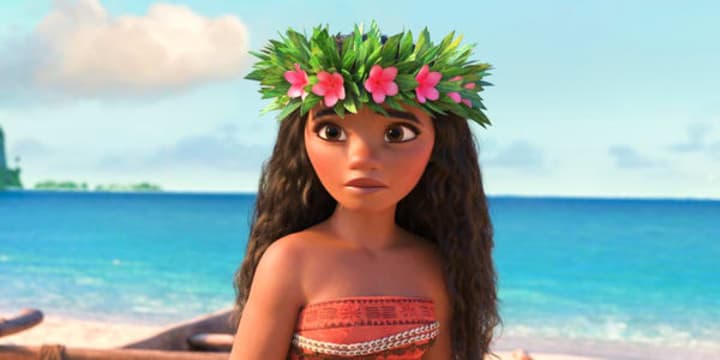
Moana contemplates her destiny [Image: Disney]
But empathy and tolerance not the only attribute many of last year's blockbuster heroes share. Many of them strive harder to build better futures for themselves and others, and seek to overthrow old systems. Moana seeks to save her people from the consuming darkness, but she also desires to become an explorer and chart the seas. She learns through the course of the film that her ancestors also sailed the ocean, but they retreated in fear following Maui's theft of Te Fiti's heart, and thus became close-minded and insular. In the opening song "Where You Are," the villagers display their reticence to new ideas, even saying:
“Who needs a new song? This old one's all we need.”
And this is in direct contrast to her vagabond ancestors who, in "We Know the Way", accept the progression of time and place when they sing:
“We tell the stories of our elders, In a never-ending chain”
Some would assert that, because Moana’s quest eventually reconnects her people with their past, it’s not arguing for progression; however, it’s worth considering that by becoming explorers, Moana and her kin are moving, learning, and ultimately growing.
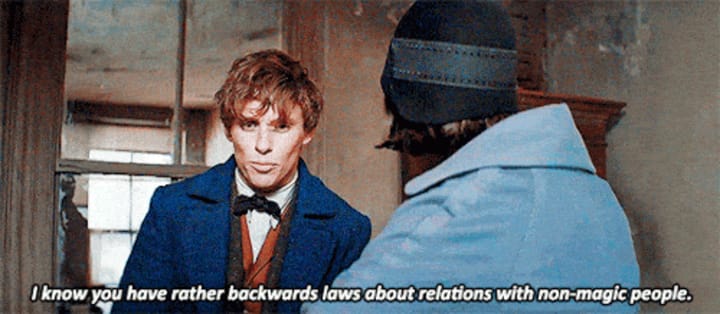
This impatience with the old ways is prevalent throughout last year’s cinema. Newt Scamander gets a bit preoccupied through the course of Fantastic Beasts, but even he has time to express contempt for the way in which his fellow wizards treat No-Maj's, as well as magical creatures. Far from being disillusioned at the conclusion of Zooptopia, Hopps and her partner Nick Wilde (Jason Bateman) still actively work to make the city a better place for everyone to enjoy.
And this brings us to another facet of 2016's heroes. Though there are still massive strides to be made in terms of onscreen representation in Western cinema, 2016 is notable because of how many heroes were female. We had Judy Hopps (Ginnifer Goodwin) in Zootopia, the rebooted Ghostbusters (much to the internet's chagrin), the strong and independent Moana, the determined protagonist of Rogue One Jyn Erso, and the intelligent Louise Banks (Amy Adams) in #Arrival.
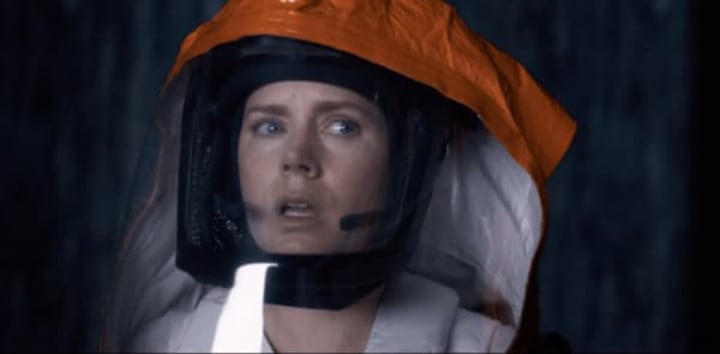
Amy Adams in Arrival [Image: Paramount]
Women generally had a larger presence across blockbusters even if they weren’t in the immediate spotlight, such as in Fantastic Beasts, where Newt Scamander (#EddieRedmayne) is accompanied by Tina and Queenie Goldstein (#KatherineWaterston and Alison Sudol). But it isn’t just the women who are getting a look in. Actors and actresses of different races are, slowly but surely, becoming more and more prominent in our movies and it is generally being discussed far more openly.
Doctor Strange has continued to get flak for its casting of the Ancient One, but it's still worth mentioning that Strange himself (#BenedictCumberbatch) confronts Kaecillius and Dormammu with the help of a black magician Mordo (Chiwetel Ejiofor) and the Asian librarian Wong (Benedict Wong). And this movie is one of the minor examples.
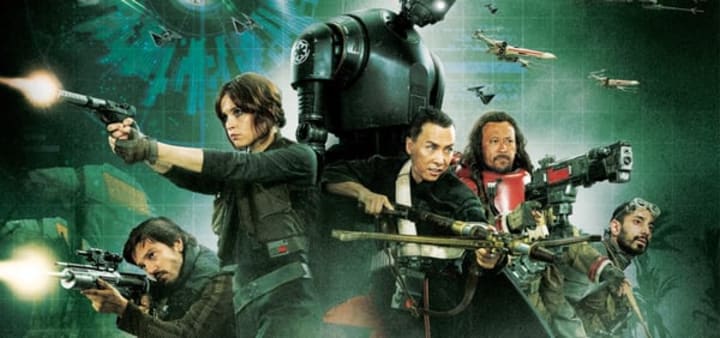
The diverse bunch of desperadoes at the center of Rogue One [Image:Lucas Film]
#StarTrek has long been pushing at the forefront of representation, but Beyond rammed this home even further. The crew of the Enterprise is a full blown mixture of humans and aliens who battle to save the sprawling multicultural space station of Yorktown. Much has also been made of the titular team in Rogue One and its racial diversity, which stands in contrast to the homogeneous Galactic Empire.
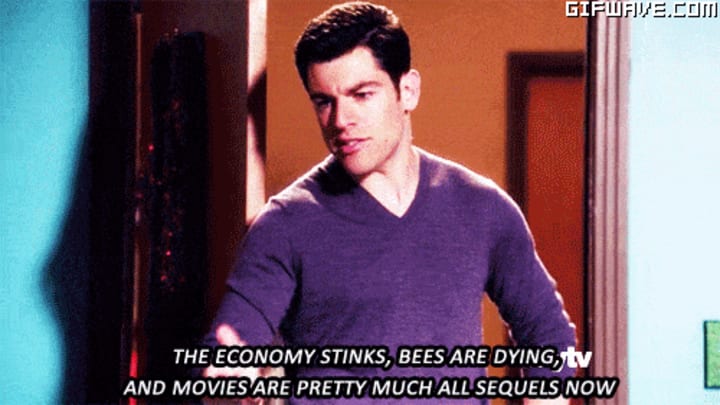
And that homogeneity is the key here. Internet critics may balk at the “forced agenda” whereby older story tropes are abandoned in favor of reinterpretations and a multiplicity of talent; however, this practice is vital to the future of our cinema. Having a larger variety of people in front of, and behind, the camera means that various opinions, backgrounds and cultures will provide innovation in our stories and prevent them from becoming stale repeats of what came before...which brings us onto the subject of our villains.
"I finally have them. The worst of the worst."
So what do Bellwether, Gellert Grindelwald and Krall have in common?
In Zootopia the sheep Bellwether uses the tensions between the predator and prey communities to invert the social structure, putting herself in charge by creating a climate of fear. As we know, the dark wizard of Fantastic Beasts, Gellert #Grindelwald, wants to overthrow the wizarding Statute of Secrecy and rule over all No-Maj's. In Star Trek: Beyond, Krall/ Balthasar Edison wants to destroy the United Federation of Planets due to his belief that conflict and struggle will make the human race stronger.
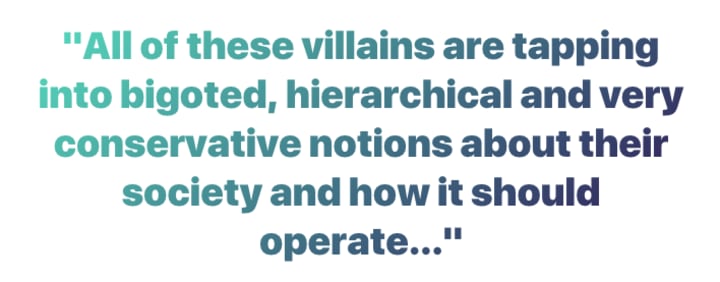
Whether it’s the divisions between predator and prey, wizards and muggles or aliens and humanity these villains all use, and are connected to, the old prejudices of their respective worlds. Each antagonist wants to maintain or reverse the troubled status quo in some shape or form, and they are willing to use scapegoats to accomplish their own ends. And as their movies progress, each of them resorts to increasing amounts of violence and hatred.
These regressive tendencies aren’t only limited to the villains of Zootopia, Fantastic Beasts and #StarTrek. Moana sees the loss of Te Fiti’s heart encourage the rise of the demon Te Kā and monsters like Tamatoa (Jemaine Clement), who seek to possess its power, and are unconcerned by the encroaching darkness that its theft has caused.
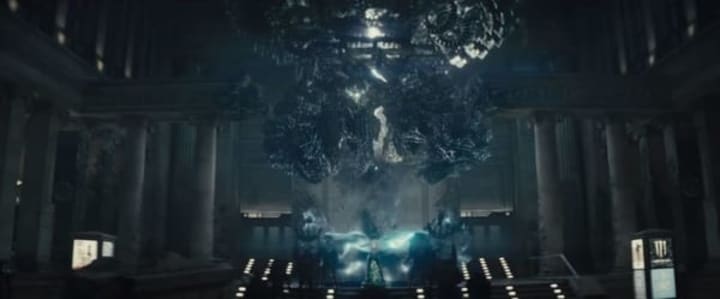
Enchantress's anti-machine...machine? [Image: Warner Bros.]
#SuicideSquad’s Enchantress (Cara Delevingne) laments the lack of magic in the #DCEU and attempts to destroy humanity’s machines so that she and her brother Incubus (Alain Chanoine) will be worshiped once again. It’s a similar situation with the titular baddie of X-Men: Apocalypse. Even the foe of #DoctorStrange, Kaecilius (Mads Mikkelsen), wants to place Earth in the Dark Dimension so that time will not progress and everyone can live forever — albeit in an autocratic way:
"This world doesn't have to die, Mister Doctor. This world can take its place alongside many which is part of the one, the great and beautiful one. And we can all live forever. As same as you, as same as everyone; life, eternal life. People think in terms of good and evil, but really, time is the true enemy of us all. Time kills everything."
Kaecilius's repeated emphasis on the uniformity of everyone and everything is not exactly encouraging, especially in relation to our heroes and the diversity of twenty-first century life.
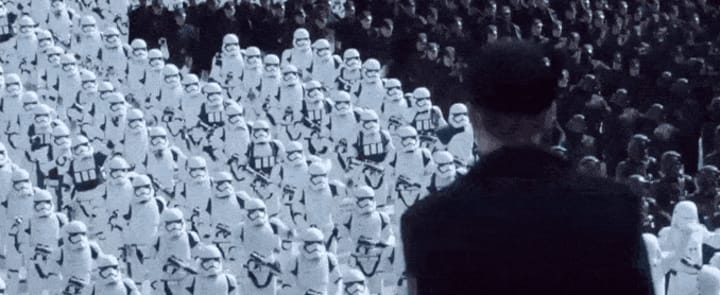
And the backwards fascistic elements of the Galactic Empire in Rogue One, which were the center of controversy in November and December, go without saying really.
All of these villains are tapping into bigoted, hierarchical and very conservative notions about their society and how it should operate, which throws the beliefs of our heroes into sharper relief.
But why is this happening? What has caused this shift in the way our heroes and villains are realized?
What's causing these cinematic connections?
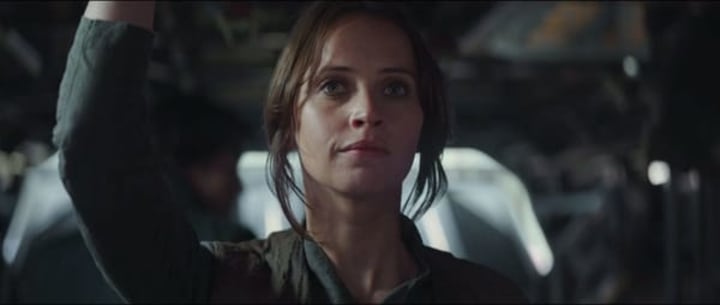
"Rebellions are built on hope!" [Image: Lucas Film]
If the heroes of Back to the Future, The Goonies and even Romeo and Juliet show only one thing, it’s that we all like to root for underdogs. If a hero is younger and less-experienced than their authoritarian adversary, then the movie already has taken a large stride towards establishing dramatic tension.
Could the prevalence of these tropes just be a coincidence?
The fact that so many of 2016's movies contain these characteristics would suggest not, and the internet and its users may be the reason why. Indeed, we all know that the internet connects people from across the globe, but it's becoming clearer and clearer how organizations, including movie studios, are using it to tailor their products for their consumers. When controversies arise over movies, filmmakers actively try to calm the critics by addressing their concerns directly, such as John Knoll did recently when he was questioned over his choice to include a CGI version of Peter Cushing in Rogue One. Moreover, it shouldn't be dismissed as mere coincidence that a year on from the #OscarsSoWhite debacle, the number of black actors and filmmakers up for major awards has increased significantly.
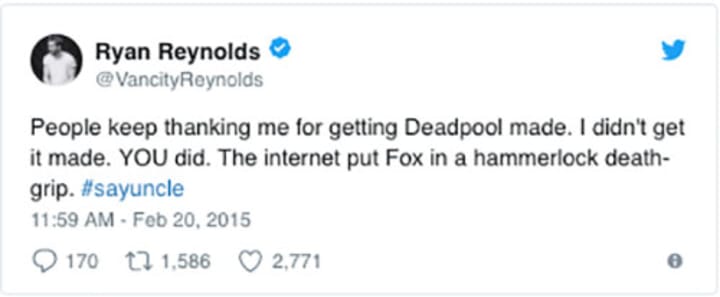
And it isn’t just about damage control. Actor Ryan Reynolds openly stated that the box-office hit #Deadpool wouldn’t have been made without the online campaigning of the character’s fans.
Given that the majority of internet users in the western world are generally between 16-24, and more tolerant and accepting than their ancestors means that they have a greater influence on the internet, and subsequently upon the way that filmmakers write and make these movies.
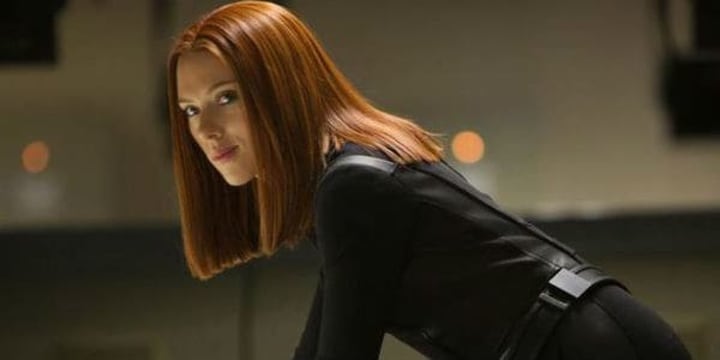
Scarlett Johansson was the top grossing actor of 2016 [Image: Marvel Studios]
Moreover, individual movies are not the only places where these changes are being felt. The BAFTA's awarding and membership rules have changed so that, from 2019, all film makers and their movies which are put forward for consideration must have made efforts to boost the representation of minority groups in the industry. And its also worth noting that three of the top five highest grossing actors were women- for the first time in movie history. This shows how seriously these issues are being taken now within the movie making business.
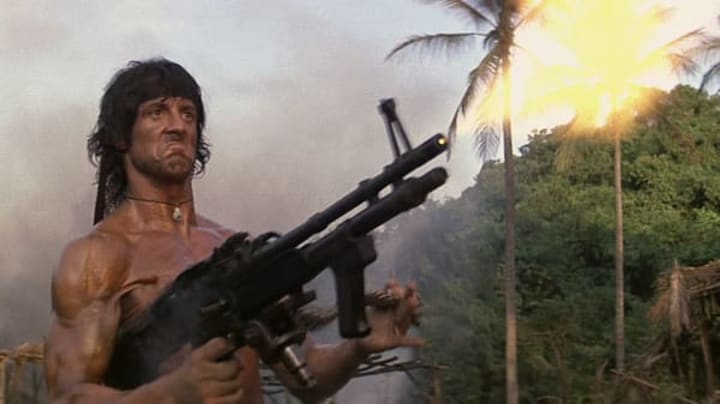
The macho Rambo [Image: TriStar Pictures]
Alternatively, the politics of America could have had a hand in shaping the movies of 2016. For better or worse, each president has brought something unique to the running of the country, and so to the mind-set of Hollywood as well. The Reagan-era was populated by macho, patriotic heroes such as Rambo (Sylvester Stallone) in Rambo: First Blood Part II. Plus the films of the 2000’s were, as we explored earlier, darker and increasingly more pessimistic, due to the continuance of George W Bush’s unpopular war in Iraq.
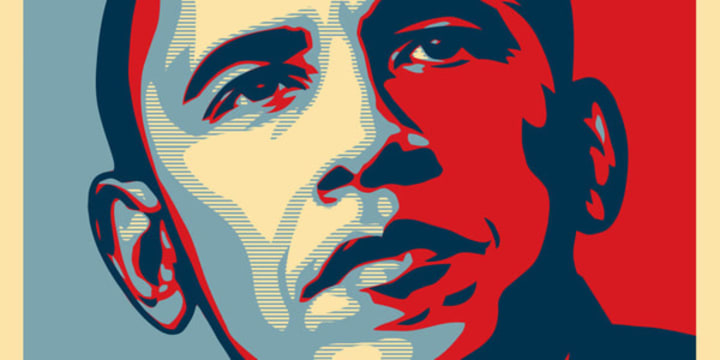
The infamous Hope poster of the Obama Campaign.
Accordingly, it’s highly plausible that 2016’s empathetic and inclusive blockbusters are a reflection of the Obama Administration's drive for equality and tolerance; the hopeful outlook of these heroes certainly mimic the famous poster of his initial campaign, and of his Tumblr Q & A:
“…look on the horizon, and there’s a lot of opportunity out there…guard against cynicism and do the remarkable things they can do.”
The societies in each of 2016's blockbusters aren’t perfect, but through their heroes, they all demonstrate that acceptance, compassion and cooperation are more wholesome, and above all, very possible. Obviously this raises a lot of questions as to how this trend will continue under Donald Trump.
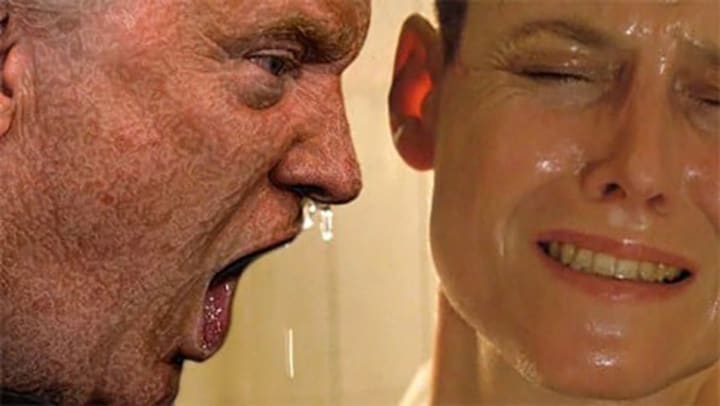
An internet Trump/movie mashup [Image: 20th Century Fox]
There are still many steps that need to be taken for equal representation and progression in cinema. After all, as the controversies for Doctor Strange andGods of Egypt show, the issues of race and whitewashing are still misunderstood by studio execs. Coupled with the fact that very few characters outside of television are #LGBTQ in mainstream cinema, our favorite studios have some substantial work to do before a happier medium is realized. Indeed, the recent and heavily debated changes to Hikaru Sulu's sexuality in Star Trek Beyond demonstrate that LGBTQ inclusion is still a touchy topic.
It is hard to predict whether or not the kind of heroes, villains and messages of 2016 will prevail. Trump's conservatism may cause the current outcrop to transmute into something different; alternatively, his right-wing politics may actually add fuel to fire of hope and radicalism in cinema.
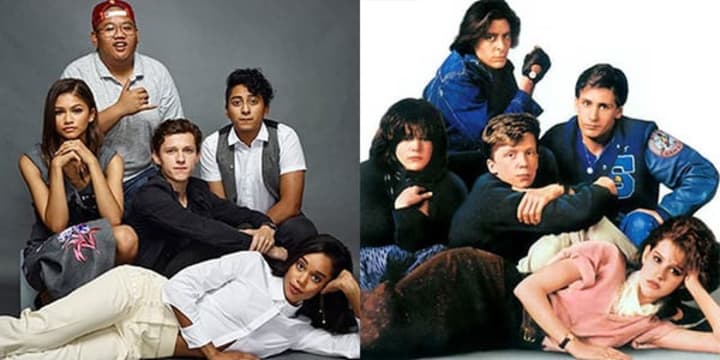
The current upswing in diversity looks set to continue, at least in Spider-Man:Homecoming [Image: Sony & Universal]
However, we can be sure that our blockbusters and our pop culture will still remain a place where we explore who we are, where we are and where we are going in the future. And lets hope that they can make even more people as happy as Cassian Andor (#DiegoLuna) in Rogue One made many Mexicans in the audience:
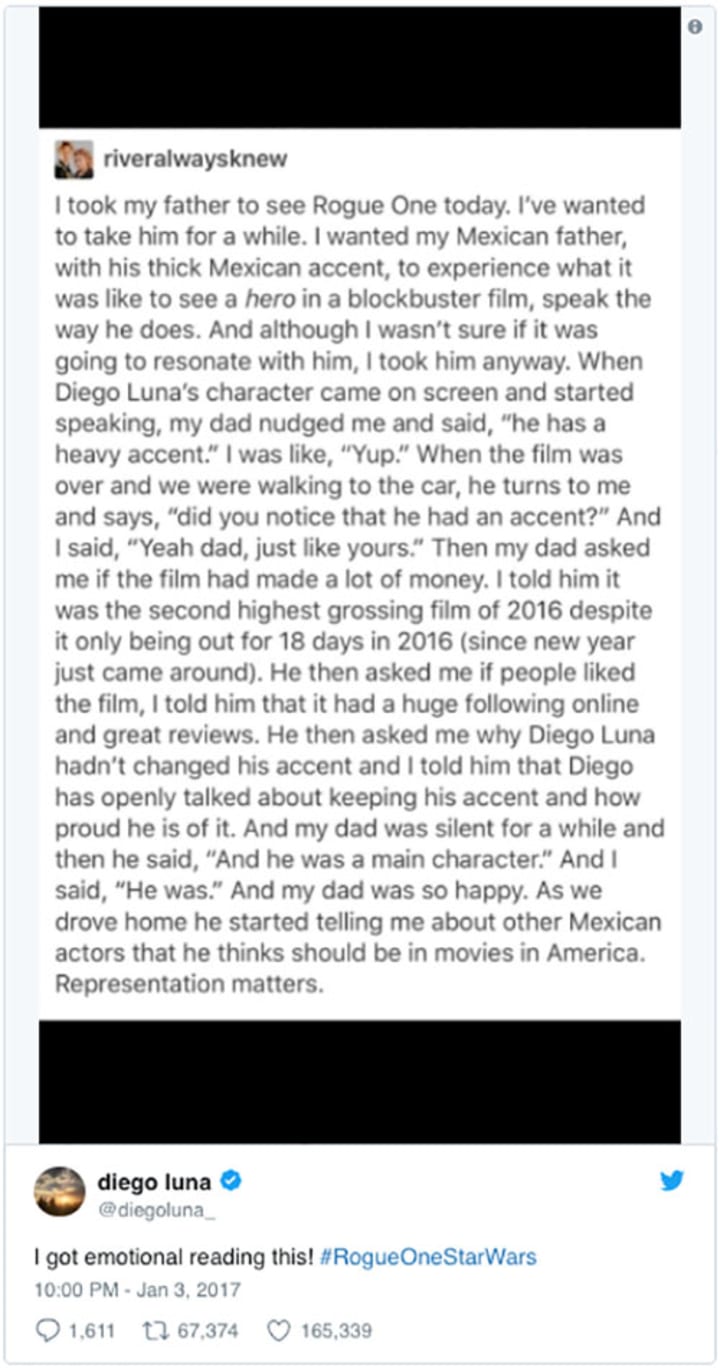
Heroes are figures that audiences are meant be inspired by, relate to, and admire; if the protagonists of 2016 are representative of our collective aspirations, then we certainly have a bright future ahead.
About the Creator
Max Farrow
A fanatical film-watcher, hill-walker, aspiring author, freelance writer and biscuit connoisseur.
These articles first appeared on Movie Pilot between Jan 2016 and Dec 2017. Follow me on Twitter @Farrow91


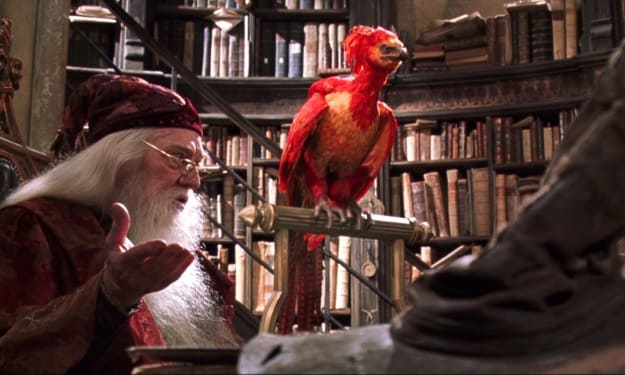



Comments
There are no comments for this story
Be the first to respond and start the conversation.